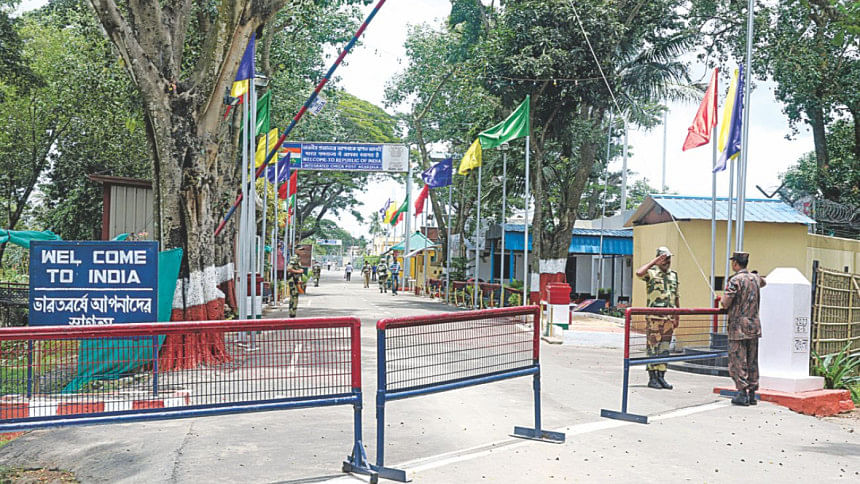Exports to northeast India may fall for transhipment

Bangladesh's exports to Tripura through Akhaura land port might fall after the government granted transhipment facility to India and the recent improvements in infrastructure on the Indian side, local businesspeople said.
India was reliant on imports from Bangladesh for a number of products, said Monir Hossain Babul, general secretary of Akhaura Clearing & Forwarding Agents' Association.
“Now, because of the transhipment facility they would no longer need to import the products from Bangladesh. They will just bring them from the other parts of India,” Babul said.
Opened in 2010, the Akhaura land port is mainly used for exports. The export items are stone, cement, waste cotton, fish, plastic and various household products. Stone is the most exported item.
Local businesspeople import boulders from India to Sylhet at $10 a tonne. Boulders are then crushed and re-exported to India's northeastern states at $25 per tonne.
Exports to Tripura fell as the shipment of stone went down, they said.
Some 2.77 lakh tonnes of goods were exported between the months of January and May, down 7.66 percent from a year earlier, according to Akhaura revenue office statistics.
Earlier, a broad gauge rail line ran from Kolkata to Karimganj in Assam. Now, a broad gauge rail line from Karimganj to Agartola has been set up. As a result, Tripura has been connected with the rest of India.
The demand for stone in Tripura and its nearby areas is met through imports from Karimganj, which pushed down the import from Bangladesh, Babul said.
“Besides, the transit facility granted to India might affect our exports.”
Another C&F agent Abbas Uddin Bhuiyan said a new product, iron rod produced by a Bangladeshi steelmaker, has created its markets in the northeastern states.
But the first consignment that India has transhipped from Kolkata to Tripura comprised of iron rods, said Bhuiyan, adding that the transhipment facility may reduce the scope for exports for Bangladesh.
He said 100 to 150 trucks carrying export goods from Bangladesh used to cross the Akhaura border every day. Now, the number has come down to 10-12.
A customs official in Akhaura, however, said trucks laden with Bangladeshi products ply in high numbers during the dry seasons, with the number sometimes rising above 100 per day. But during the rainy season, it averages 20.
Both Babul and Bhuiyan said the transit facility that Bangladesh has recently granted India through Akhaura may decrease the country's exports to Tripura.
However, Md Anwar Hossain, customs excise and VAT commissioner in Comilla, said the import of stone from India to Sylhet remained suspended for some local reasons. “It is not that the transit will decrease exports. Rather, the transit may push up exports.”
Transhipment would not be possible if there is no better infrastructure, and the infrastructure that will be built up for this route will benefit exporters in Bangladesh as well, Hossain said.
There are many goods that are exported through Akhaura and will not be brought under the transhipment facility.
The VAT commissioner thinks India will transport heavy goods and machinery using the transit facility.
Bhuiyan said because of import duties, iron rod imported from Bangladesh costs more compared to those brought through the transit facility, although the latter includes transhipment charges.
If exporters get duty benefit it would help them, he said, urging the government to hold talks with India so that exporters get incentives.
If exporters get some duty benefits the northeastern states will remain an export destination as the quality of Bangladeshi items is good, said a number of businesspeople and officials.
Bangladesh exports fish to Tripura, which gets tax-free access as the state does not produce any fish. Every morning two to three trucks full of pangasius and tilapia fish travel to Tripura, according to Bhuiyan.
At the inauguration of transhipment in Ashuganj port last week, ministers, policymakers and government officials of Bangladesh and diplomats of India said the new arrangement will boost both the economies by promoting trade and movement of people.

 For all latest news, follow The Daily Star's Google News channel.
For all latest news, follow The Daily Star's Google News channel. 



Comments